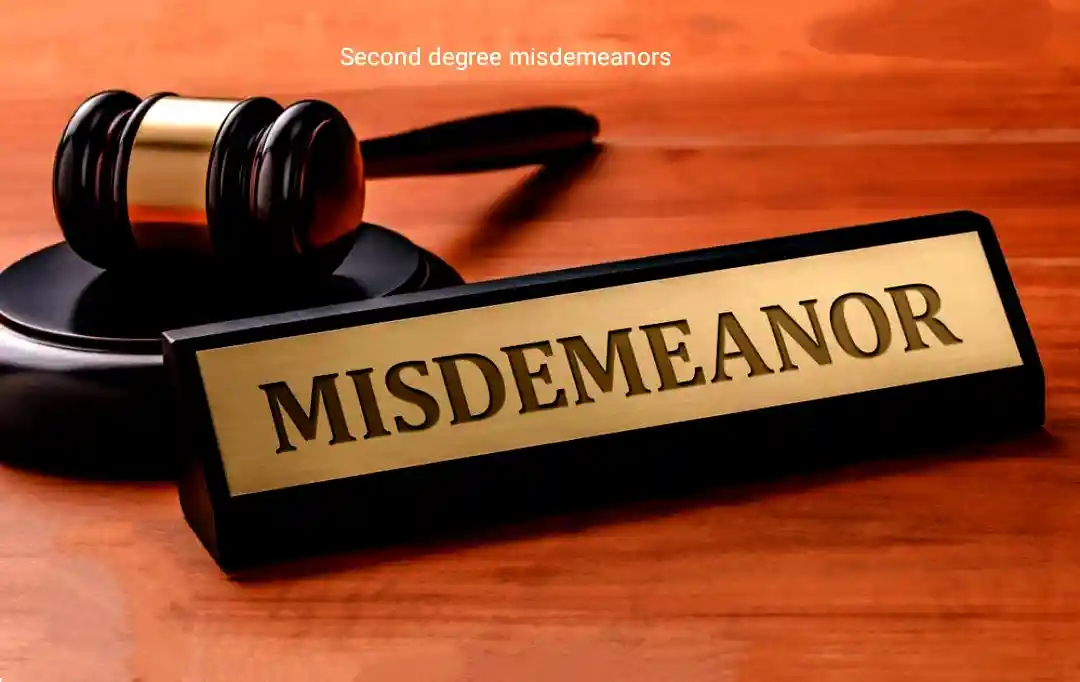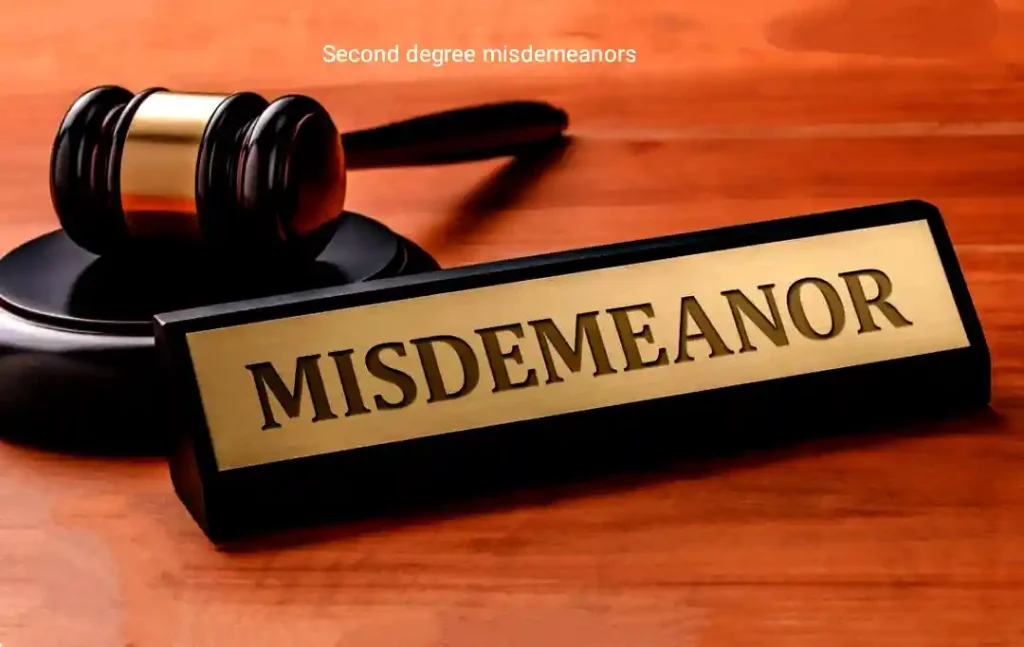Understanding Second Degree Misdemeanors: A Comprehensive Guide

A second degree misdemeanor may sound less severe than a felony, but the implications can be more significant than many realize. Understanding the nature, penalties, and legal nuances of a second-degree misdemeanor is crucial for anyone involved in the legal system and those who want to comprehend the spectrum of criminal charges better. This comprehensive guide will dive into what constitutes a second-degree misdemeanor, its legal consequences, and practical strategies for dealing with such charges.
What is a Second Degree Misdemeanor?
Table of Contents
A second degree misdemeanor is classified as a lower-level criminal offense. It is less severe than a first-degree misdemeanor or felony but can still result in significant penalties, including jail time, fines, and a criminal record. Generally, these offenses are considered non-violent, and the maximum penalty varies based on jurisdiction. It often results in up to 60 days in jail and fines reaching around $500.
A second-degree misdemeanor is an offense that falls into the middle tier of the criminal justice system. Although not considered a major crime, it can carry real consequences, impacting employment, housing, and even personal relationships.
Common Examples of Second Degree Misdemeanors
Some numerous activities and behaviors can lead to a second degree misdemeanor charge. Some of the most common examples include:
- Disorderly Conduct: Acting disruptively, such as public intoxication or causing a public disturbance.
- Petty Theft: In some jurisdictions, shoplifting or stealing items of low value can be classified as a second-degree misdemeanor.
- Simple Assault: A threat or physical altercation without serious injury may also fall into this category.
- Trespassing: Unauthorized entry onto private property, as long as no severe damage is caused, often results in a second-degree misdemeanor charge.
- Driving with a Suspended License: If the driver was unaware of the suspension, it may be charged as a second-degree misdemeanor.
While these offenses may seem minor, they can still carry long-term effects beyond legal penalties.
Legal Consequences of a Second Degree Misdemeanor
The penalties for a second degree misdemeanor can vary significantly by state or country, but typically include:
- Jail Time: Up to 60 days in a county or local jail, depending on the severity of the misdemeanor and any prior offenses.
- Fines: Fines are typically capped at $500, but additional court fees or restitution payments may also apply.
- Probation: In many cases, the judge may choose probation instead of jail time. Probation terms might involve regular meetings with a probation officer, community service, or substance abuse counseling.
- Community Service: Courts can require a set number of community service hours, especially when it seems beneficial to the community.
- Permanent Record: A conviction can stay on your criminal record, affecting your ability to obtain specific jobs or housing.
Other factors, including the defendant’s criminal history and the specific nature of the offense, often influence the sentencing guidelines.

How a Second Degree Misdemeanor Differs From a First-Degree Misdemeanor and Felony?
Understanding the difference between first-degree misdemeanors, second degree misdemeanors, and felonies is crucial for grasping the seriousness of the charge you might be facing.
- First-Degree Misdemeanors: More severe than second-degree misdemeanors, these offenses often involve harsher penalties, including up to a year in jail and higher fines. Examples include DUI charges without injuries and more severe theft cases.
- Second Degree Misdemeanors: As discussed, these are often viewed as less severe. However, a conviction can still have serious consequences.
- Felonies: These are the most severe offenses, often involving significant jail time (over one year) in a state or federal prison, hefty fines, and lifelong implications, such as the inability to vote or own firearms.
Second-degree misdemeanors are often referred to as the “middle child” of criminal charges—they are less harsh than other offenses but still impactful in both the short and long term.
Potential Defenses Against Second Degree Misdemeanor Charges
Facing a second degree misdemeanor charge can be overwhelming, but several potential defenses could mitigate or dismiss the charge. These defenses include:
- Lack of Evidence: A lack of sufficient evidence to support the charges could lead to the case being dismissed.
- Self-Defense: In simple assault cases, arguing self-defense may prove successful if you demonstrate that you were in immediate danger.
- Mistaken Identity: If you were wrongfully accused, mistaken identity could be an effective defense. Witness statements and other proof can help establish this.
- Consent: If the alleged “victim” consented to the actions that led to the charge, this could serve as a legal defense.
- Constitutional Violations: If law enforcement violated your rights during the arrest, such as conducting an illegal search or failing to read Miranda rights, the charges may be reduced or dropped.
Consulting a criminal defense attorney who understands local laws is crucial to determining the most suitable defense strategy.
Legal Process: Arrest to Trial
The legal process for a second degree misdemeanor typically includes several steps, from the initial arrest through trial, including:
- Arrest: After law enforcement makes an arrest, you may be held until bail is determined.
- Arraignment: You will appear in court, where the charges will be formally presented. You can plead guilty, not guilty, or no contest.
- Pretrial Hearings: These meetings determine the direction of the case. At this stage, plea bargain negotiations often occur.
- Trial: A trial will be held if no plea bargain is agreed upon. A judge (rather than a jury) will often decide your fate for second-degree misdemeanors.
- Sentencing: If convicted, the judge will determine your penalties, including jail time, fines, probation, or community service.
Understanding the legal process can help you make informed decisions and mitigate the consequences of your charge.
Long-Term Effects of a Second Degree Misdemeanor Conviction
A conviction for a second-degree misdemeanor can lead to several long-term effects, including:
- Employment Challenges: Many employers conduct background checks, and a criminal record could hinder job opportunities.
- Housing Issues: Renting an apartment may become more challenging if a landlord refuses to lease to individuals with a criminal background.
- Travel Restrictions: A criminal record might also affect your ability to travel, particularly internationally.
- Professional Licensing: Some professions require a clean criminal record for licensure, which a misdemeanor could compromise.
These consequences highlight why minor charges like second degree misdemeanors should be taken seriously.
Expungement and Record Sealing
Many jurisdictions offer expungement or record-sealing options to help lessen the impact of a criminal record. Expungement removes the conviction from public records, while record sealing restricts access to certain entities, like potential employers.
For a second-degree misdemeanor, eligibility for expungement often depends on:
- Time Passed Since Conviction: Some states require a waiting period of several years before expungement is possible.
- No Additional Charges: Eligibility may depend on remaining crime-free after your conviction.
Consult an attorney to explore your eligibility and navigate the complexities of clearing your criminal record.
How to Minimize the Impact of a Second Degree Misdemeanor ?
If you’ve been convicted of a second degree misdemeanor, there are steps you can take to minimize its impact:
- Pay Fines Promptly: Ensuring all fines are paid on time can help mitigate the impact of your misdemeanor.
- Complete Community Service: Prompt completion of community service requirements shows accountability and may reflect positively in future employment scenarios.
- Seek Legal Counsel: Lawyers can provide guidance on how to lessen the impacts, including potential probation terms.
- Consider Counseling: Voluntarily seeking counseling for issues like substance abuse might help minimize future legal problems and create a positive impression in court.
By demonstrating remorse and taking corrective actions, you can reduce the longer-term impact of your conviction.
Second degree misdemeanor Florida
In Florida, a second degree misdemeanor is a type of criminal offense less severe than first-degree misdemeanors and felonies. Still, it involves criminal activity that can lead to legal penalties. Common examples of second-degree misdemeanors in Florida include minor Theft, disorderly conduct, or driving without a valid license.
Penalties for a Second Degree Misdemeanor in Florida
The maximum penalties for a second-degree misdemeanor in Florida include:
- Up to 60 days in jail
- A fine of up to $500
- Possible probation
These offenses are generally considered less severe, and depending on the nature of the crime and the circumstances, they can often be resolved with alternative sentencing options, such as probation, fines, or community service.
Examples of Second Degree Misdemeanors
Here are some common offenses that are categorized as second-degree misdemeanors in Florida:
- Driving with a Suspended License (first offense)
- Disorderly Intoxication
- Petty Theft (involving property valued at less than $100)
- Loitering and Prowling
These offenses typically involve less severe or minor actions than first-degree misdemeanors, but they are still punishable under Florida law.
Legal Representation
Even though a second-degree misdemeanor is considered a minor offense, it can still lead to a criminal record and significantly affect your future employment, housing, and other areas of life. If you are facing such charges, seek the help of a legal professional who can assist you in navigating the legal system and potentially reducing or dismissing the charges.
Dui second degree misdemeanor Florida
A second-degree misdemeanor in Florida is a relatively low-level criminal offense, but it can still carry significant penalties. Under Florida law, second-degree misdemeanors are punishable by:
- Up to 60 days in jail
- A fine of up to $500
- Probation of up to 6 months
Second degree misdemeanors include:
- Minor theft (petit theft for items worth less than $100).
- Certain traffic violations (like reckless driving in specific cases).
- Simple assault.
Although a second-degree misdemeanor might not seem severe, it can still result in a criminal record, which can affect future employment or housing opportunities.
Legal Process and Options
If charged, you may be eligible for alternative options like a diversion program or pre-trial intervention, especially if it’s your first offense. This can potentially lead to a dismissal of charges upon completing specific requirements, like community service or counseling.
Legal Assistance
Consider consulting with a criminal defense attorney. They can explain your rights, negotiate with prosecutors, and help achieve the best possible outcome.
Second degree misdemeanor pa
In Pennsylvania, a second-degree misdemeanor (M2) is a less serious criminal offense than a first-degree misdemeanor but more severe than a third-degree misdemeanor. However, the consequences of an M2 conviction can still be significant and may include both criminal and civil penalties.
Examples of Second-Degree Misdemeanors in PA:
- Simple assault (in certain circumstances)
- Indecent exposure (when it involves less severe situations)
- Theft (for property valued between $50 and $200)
- Stalking (without physical injury)
Penalties for Second-Degree Misdemeanor in PA:
- Jail Time: Up to 2 years in prison
- Fines: Up to $5,000
Legal Consequences:
- Criminal Record: A second-degree misdemeanor will appear on your criminal record, which may impact future employment opportunities, ability to rent an apartment, and other aspects of daily life.
- Probation: Instead of jail time, you may be placed on probation, typically for a similar period.
Expungement:
In Pennsylvania, second-degree misdemeanors are generally eligible for expungement under certain conditions, such as after ten years without further criminal offenses or if the defendant was under a diversion program.
If you are charged with a second-degree misdemeanor, it’s advisable to seek legal advice to fully understand your rights and the potential outcomes.
Frequently Asked Questions
Q1. Can a second degree misdemeanor be upgraded to a first-degree misdemeanor?
In some cases, depending on the circumstances of the crime and any aggravating factors, a prosecutor may choose to upgrade the charges. This often happens if the act causes significant harm or involves repeat offenses.
Q2. Can I avoid jail time for a second degree misdemeanor?
Yes, avoiding jail time is possible, especially if this is your first offense. Depending on your prior record and the specifics of the case, courts may grant probation or allow alternative sentencing, like community service.
Q3. How can I know if I’m eligible for expungement?
Consulting an experienced attorney is the best way to determine expungement eligibility. You may need to fulfill several requirements, including a specific waiting period and proof of remaining crime-free.
Q4. Is it necessary to hire a lawyer for a second degree misdemeanor?
Although it’s possible to represent yourself, hiring an experienced lawyer is highly recommended. They understand local laws and can provide effective defense strategies that reduce or dismiss your charges.
Q5. How long does a second-degree misdemeanor stay on my record?
In most cases, a misdemeanor stays on your record permanently unless you qualify for expungement or sealing. Each state has different regulations; some may allow automatic expungement after a certain period.
Conclusion
A second degree misdemeanor may seem minor compared to other criminal charges, but its impact can be lasting and significant. From jail time to restrictions in employment and housing, understanding the full implications of a second-degree misdemeanor is crucial. Hiring an experienced attorney, understanding potential defenses, and knowing your rights can help minimize the adverse effects of these charges.
Whether you are facing a charge or simply wish to better understand the complexities of misdemeanors, staying informed is your best line of defense. Always consult a legal professional for personalized guidance, and remember, the decisions you make now can profoundly impact your future.
Related post.



